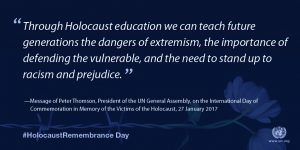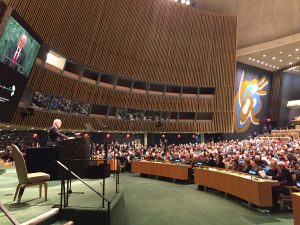Statement by H.E. Peter Thomson, President of the 71st Session of the UN General Assembly, on occasion of the Annual Observance of the International Day of Commemoration in Memory of the Victims of the Holocaust
27 January 2017
Secretary-General Guterres
Excellencies,
Mr. Noah Klieger
Mrs. Marion Wiesel
Distinguished guests,
Ladies and gentlemen,
Welcome all to the United Nations this morning. Holocaust survivor and Nobel Peace Prize laureate, Elie Wiesel, who passed away last year once said, “How does one mourn for six million people who died? How many candles does one light? How many prayers does one recite? Do we know how to remember the victims, their solitude, their helplessness? They left us without a trace, and we are their trace.”
These words go the heart of why each and every year we commemorate the memory of the victims of the Holocaust. “We are their trace.”
Who can doubt that the Holocaust was a defining moment in history.
The systematic persecution and murder of so many millions of people by the Nazi regime has left a deep scar on humanity’s conscience. It opened many unanswered questions about the unspeakable acts of brutality that humans are capable of inflicting upon each other, when intolerance, hatred, and discrimination are inflamed and incited.
One third of all Jewish people were killed during the Holocaust, and countless others were targeted because of their race, religion, ethnicity, disability, sexual orientation, or their political or ideological persuasion.
Today, we honor those victims.
We guard their memories from the passage of time so that what was done to them may never be forgotten.
On this day we rededicate ourselves to learning the lessons of the past so that humanity may never repeat such atrocities in the future.
Still, despite the incomprehensible scale of human suffering caused by the Holocaust, we continue to witness anti-Semitism and other forms of racial and ethnic discrimination on the rise in many quarters of the world.
We continue to hear the voices of Holocaust deniers, and every day we read word of those stoking hatred, bigotry, and extremism.
Our newspapers and TV screens are filled with acts of violence and discrimination being perpetrated against ethnic and religious minorities, prompted by incitement and intolerance.
The theme of this year’s International Day of Commemoration – ‘Holocaust Remembrance: Educating for a Better Future” could not be more timely.
It is a great privilege for us today to have Noah Klieger – a Holocaust survivor and journalist who has dedicated his life to Holocaust education – as a keynote speaker.
Through Holocaust education we can teach future generations the dangers of extremism, the importance of defending the vulnerable, and the need to stand up against racism and prejudice. Such education is indeed central to our shared wish to sustain peace on our planet.
Interfaith dialogue, respect for human rights, and the embracing of democratic and humanist values at the heart of the Sustainable Development Goals are central responsibilities for us all.
Young people must be taught the ethics and logic inherent in defending our common humanity, of preventing mass atrocity crimes, and of bringing perpetrators to justice.
All of us here at the United Nations have a special responsibility to integrate these lessons into our work, to embody the highest moral standards, and to promote tolerance, human rights, and human dignity.
Excellencies, Ladies and Gentlemen
On this International Day of Commemoration in Memory of the Victims of the Holocaust, let us take a pause in our own lives to remember the victims, to listen carefully to the stories of survivors, and to reflect on what each of us may do in uncertain times to help build a world of sustained peace.
Thank you.



